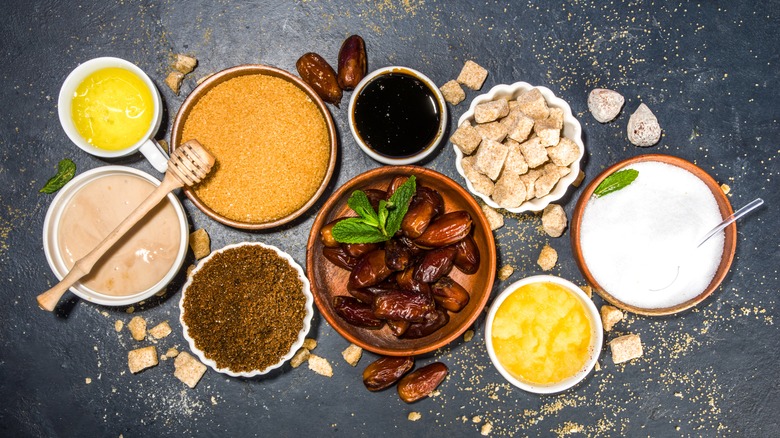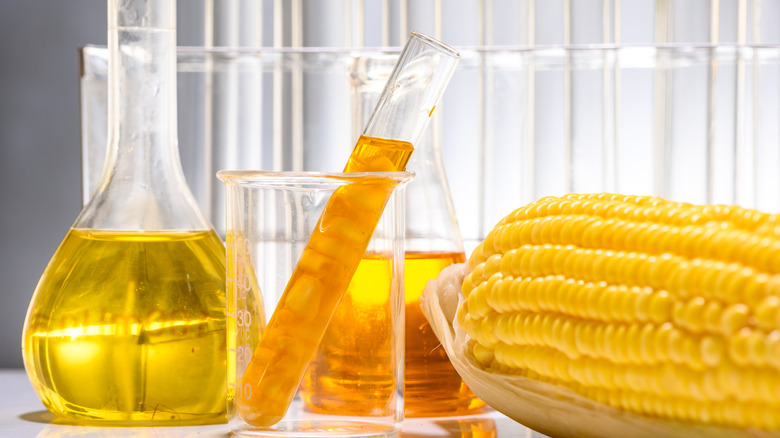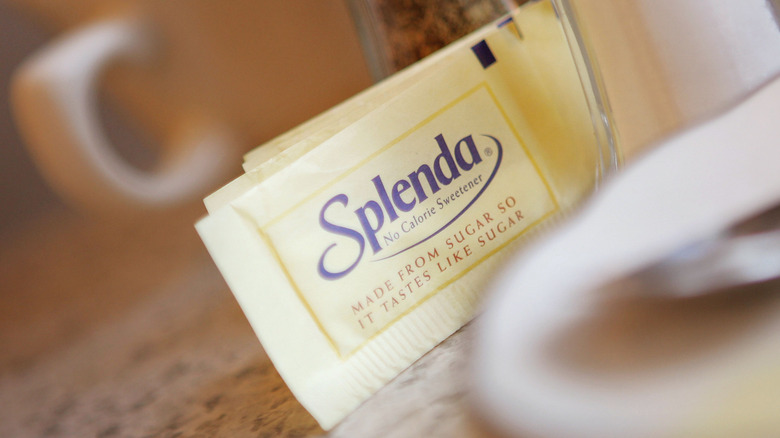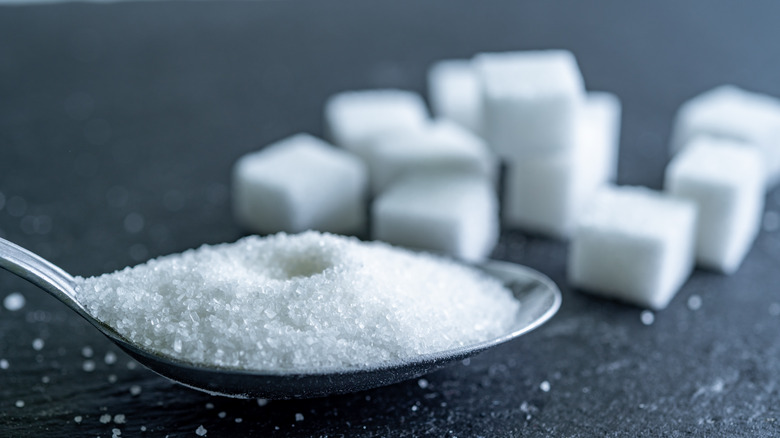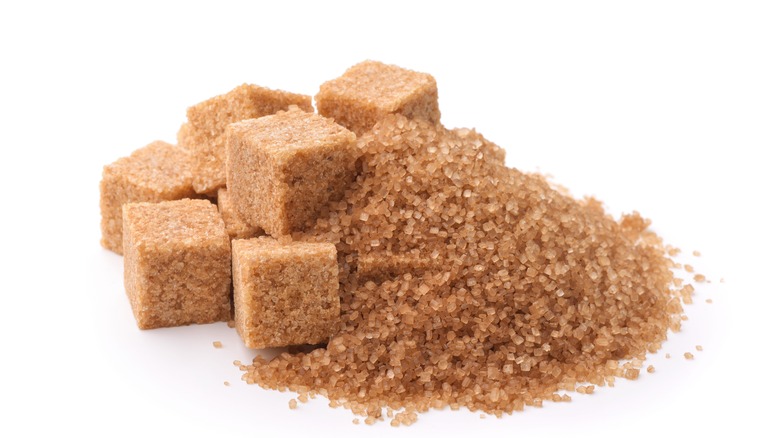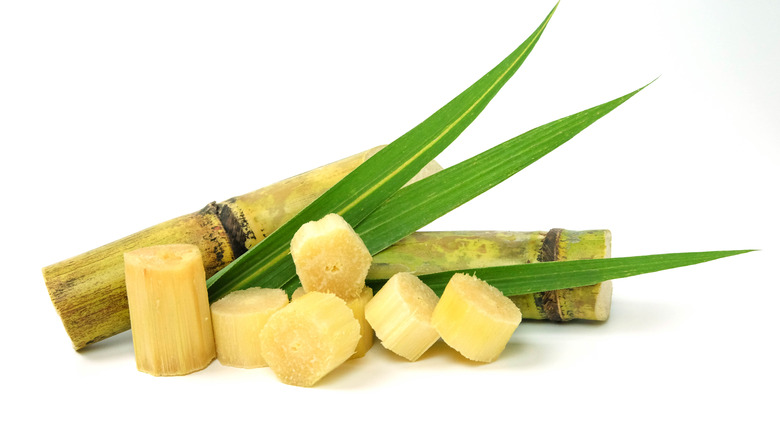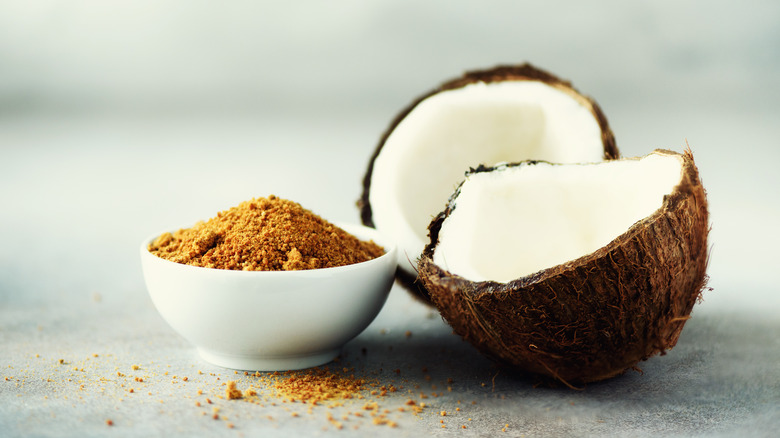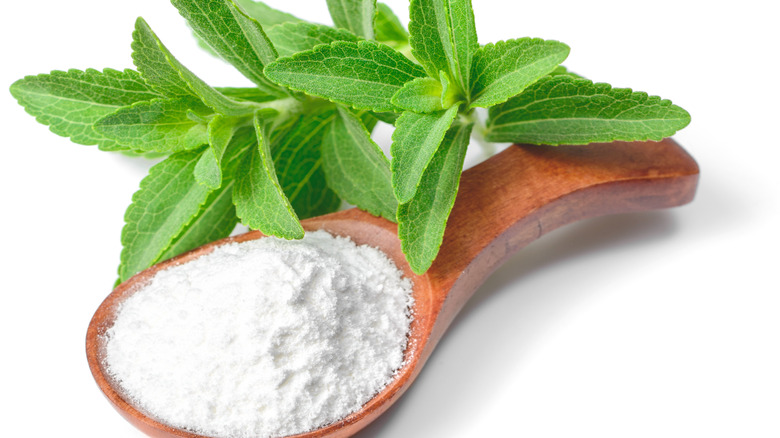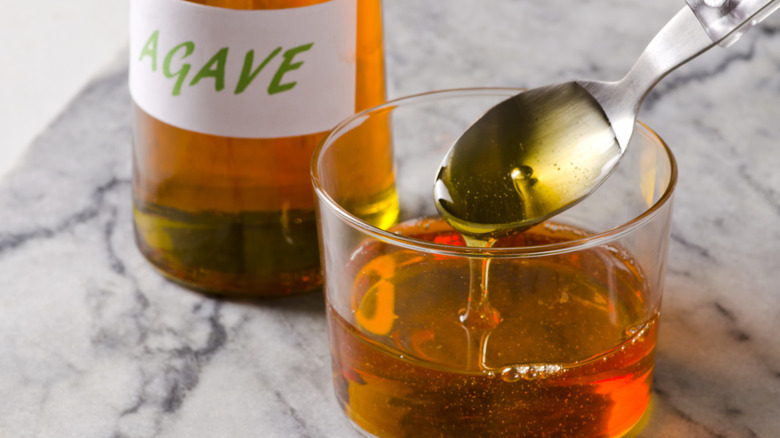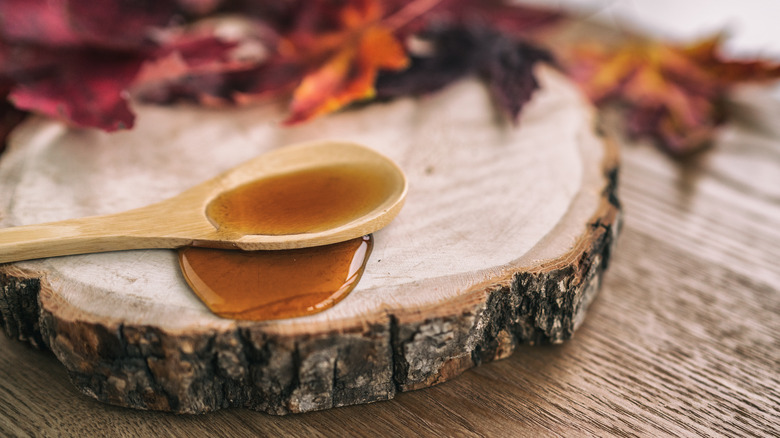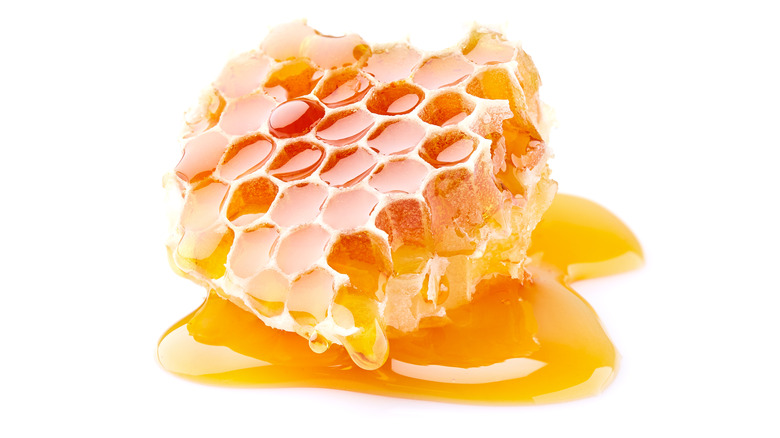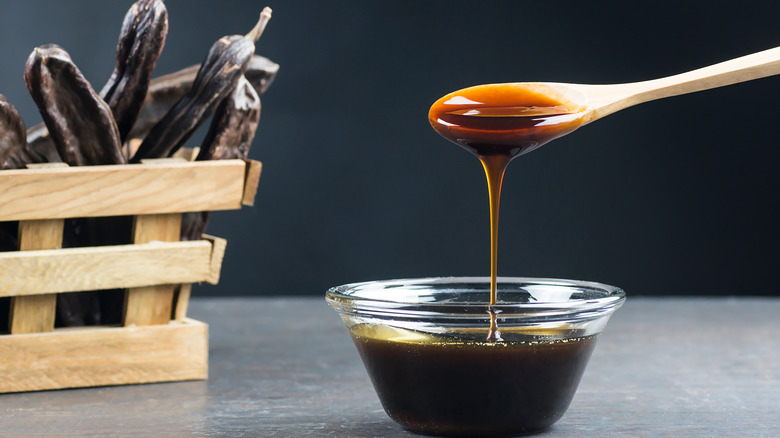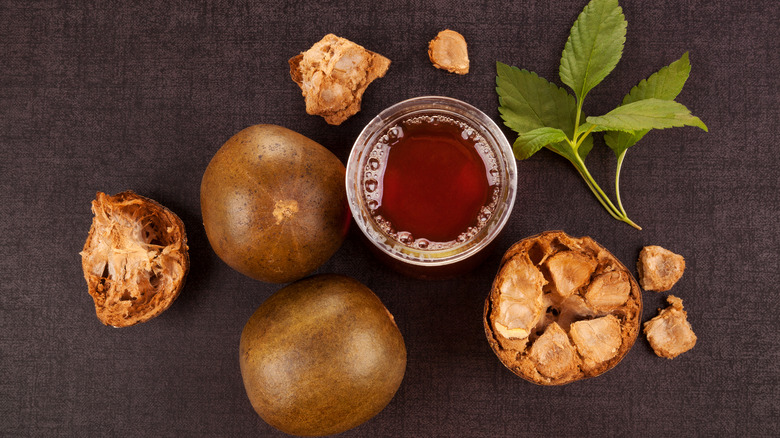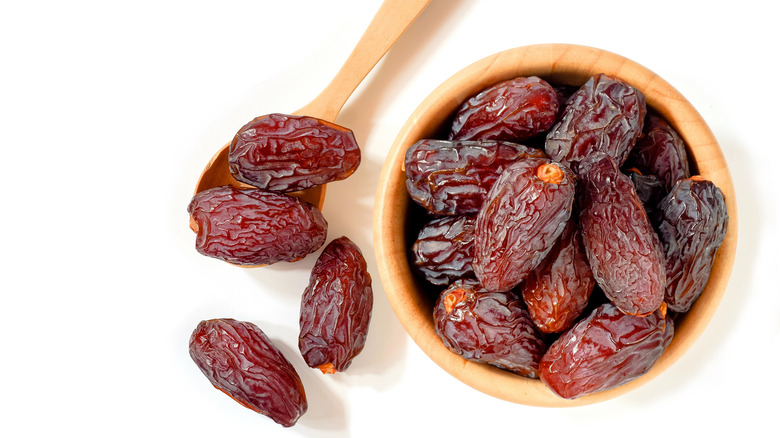13 Types Of Sweeteners Ranked Worst To Best
Perhaps one of the most controversial products in today's food industry is sugar, from naturally derived sources like sugar found in fruit or dairy, as well as sugar substitutes and artificial sweeteners. According to Harvard Health, consuming too much sugar can lead to chronic inflammation, cardiovascular disease, diabetes, and certain types of cancer. While experts generally advise a diet low in sugar, not all sources of sugar are created equal, making it difficult to decipher healthier options from more potentially harmful ones.
With over 60 alternative names for sugar, food manufacturers have found clever ways to disguise added sugar in processed food and beverage labels for decades, arguably contributing to a rise in health problems associated with excessive sugar consumption. Consuming natural sweeteners like honey or maple syrup may be less harmful than their synthetic sugar counterparts, but the bittersweet bottom line is that consuming too much sugar of any kind does not contribute to a healthy lifestyle.
From natural sweeteners like honey and maple syrup to artificial sugar substitutes to plain white and brown sugar, we're delivering a comprehensive list of sweeteners ranked from worst to best for your overall health and wellbeing.
13. High-fructose corn syrup
Derived from corn, high-fructose corn syrup is a manufactured liquid syrup sweetener that is typically added to packaged foods and beverages like soft drinks, flavored yogurts, condiments, white bread, and other highly processed foods. While it's best to limit all sources of sugar due to the negative impacts they may have on your health, high-fructose corn syrup may be one of the worst offenders. High-fructose corn syrup is a high-calorie food additive with practically zero nutritional value.
Moreover, Healthline notes that researchers have found that long-term intake of high-fructose corn syrup may be linked to diseases like diabetes, fatty liver disease, and heart disease. The best way to avoid consuming high-fructose corn syrup is to steer clear of soft drinks and flavored beverages, to read the nutrition label before you purchase packaged foods, and to limit your consumption of super-sweet and heavily processed treats like cake and cookies.
12. Artificial sweeteners
According to Harvard Medical School, there are currently five artificial sweeteners approved by the Food and Drug Administration. These include saccharin, acesulfame, aspartame, neotame, and sucralose. These artificial sweeteners can be found in foods such as diet soda and any packaged item that's labeled "sugar-free", but they aren't necessarily a healthier alternative to plain sugar. That's because tricking the brain or body into thinking it's consuming sugar when it's really not may actually backfire and encourage the development of long-term illness and disease like obesity, according to TIME.
More specifically, U.S. Right to Know argues that aspartame — the non-caloric sugar that's often used in diet soda — has been linked to certain types of cancer, brain tumors, cardiovascular disease, stroke, memory and mood disorders, kidney failure, and more. With a list of harmful health effects like that, it's a no-brainer that the extra calories from sugar may not be worth it.
11. White sugar
White sugar can be found in almost all packaged or processed foods, from pasta sauce to salad dressings to breakfast bars. Food manufactures have tapped into the consumer's weakness for sugar by adding it as a flavor enhancement, as well as a way to lengthen the shelf life of food (via Ohio State University). If our current society were consuming sugar at rates matching our earliest ancestors, white sugar would not present a problem. However, according to Women's Health, adults today eat an average of 70 pounds of sugar per year. That's a level that could well be contributing to an alarming list of health problems including obesity and diabetes.
To reduce your intake of white sugar, experts recommend eliminating consumption of processed foods, reading food labels thoroughly, avoiding foods that claim to be low in fat, swapping candy and other treats for fresh fruit, and giving up sugary beverages like soda and juice (via Verywell Health).
10. Brown sugar
Molasses is found naturally in sugarcane plants and is removed during the process of making white sugar. It's then added back in to create brown sugar, according to the New York Times. In other words, brown sugar is essentially the same as white, with the addition of molasses from the original plant source. That just might make it a fraction better in terms of health and nutritional value, although that's not saying much.
Another important quality of brown sugar is that it comes in varying types such light brown, dark brown, and turbinado, among others. Nutritionally, it includes calcium, potassium, iron, and magnesium, though in relatively small quantities, according to Verywell Fit. Other various benefits believed to be derived from consuming brown sugar include a boost in metabolism due to the molasses (via Obesity Research) and improved skin tone and texture when used as an exfoliant. However, Healthline notes that sugar scrubs may not be all that great for you skin after all, so proceed with caution.
Although these potential health benefits do make brown sugar a more advantageous option than white sugar, the negative health impacts are similar to the risks found in white sugar, so it's best to consume in moderation.
9. Cane sugar
Natural cane sugar still is not exactly a healthy option when compared to other sweeteners, but it does beat out refined white sugar in terms of nutrition, albeit only by a hair. That's because cane sugar, which is derived from the sugar cane plant (a tall, perennial grass with feather-like flowers), is slightly less processed than granulated white sugar, as per MasterClass.
There are several different types of cane sugar, the best as far as nutrition and mineral content goes, would be organic raw cane sugar, as per Dr. Axe. However, aside from carbohydrates and calories, there's nothing truly advantageous to consuming cane sugar other than it being a slightly better option than the refined white sugar often seen on grocery store shelves. That said, the aforementioned health risks associated with overconsumption of sugar in any form are just as prevalent in cane sugar, so, like all the sweet things in life, it is perhaps best enjoyed in moderation.
8. Palm sugar
A tablespoon of sugar is a tablespoon of sugar no matter how you slice it, but palm sugar may in fact hold more nutritional value and health benefits than any sweetener mentioned in this list thus far. Also referred to as coconut sugar, The City Cook notes that palm sugar is derived from the flowers of coconut or date palm trees, which produce a sap that is then extracted to create this type of sugar.
Although it's usually more expensive than counterparts like white or brown sugar, the potential health benefits may be worth the splurge. According to The City Cook, palm sugar contains potassium, calcium, magnesium, zinc, and a variety of amino acids. Furthermore, palm sugar's taste and texture is reportedly is more satisfying than that of brown sugar of any kind. Although it's not completely devoid of nutrition, however, the fact remains that palm sugar is still a sugar. This means that the same guidelines for most other sugars still apply here — consume in moderation and at your own risk.
7. Stevia
While stevia is a substitute for sugar, it's derived from a plant as opposed to a factory, as per Live Science. For some, this makes it a far superior option when compared to truly artificial sweeteners like aspartame or saccharin. The stevia plant is actually related to daisies and ragweeds and is traditionally grown in remote regions of South America, where indigenous people have been using it to sweeten foods for centuries.
As a zero calorie sweetener, it may help reduce the risk of obesity or diabetes, as well as aid in lowering blood sugar. However, the research that would prove these theories is still pending. While stevia is generally considered to be safe when consumed in moderation, certain types of stevia are not yet approved by the Food and Drug Administration. These include stevia leaf and crude stevia extract, which are not allowed to be imported into the United States for use as sweeteners.
6. Agave
Agave syrup, also known as agave nectar, is a sweetener derived from the blue agave plant. It is similar to maple syrup and honey in that it's plant-based, offers a low glycemic index when compared to other processed sugars, and it contains nutrients and minerals not found in artificial sweeteners or refined sugar.
As a vegan-friendly sweetener alternative, according to Verywill Fit, agave is touted as being unrefined and free from additives. It's also a sweeter option than white sugar, so it may be used in smaller quantities to achieve the same level of sweetness, and therefore may help reduce sugar intake when substituted for white sugar. Yet, it's still not exactly health food. While it does contain trace amounts of minerals and phytonutrients, the quantity and quality does not meet the level found in other plant-based sweeteners like maple syrup or raw honey. So, it's not quite as beneficial to your body as other sweeteners, but it's still an arguably better option when compared to artificial sweeteners or table sugar.
5. Pure maple syrup
Maple syrup is a natural product derived from the sap of maple trees, which is then boiled down to create a more dense, sugar-concentrated syrup (via Cornell University). Touted as a healthier option in baking and cooking than refined sugar, as per Dr. Axe, maple syrup is rich in antioxidants, which are believed to help in the prevention of certain types of cancer, as well as chronic illnesses like diabetes and heart disease.
As a plant-based sweetener, maple syrup also contains polyphenol antioxidants, which may help reduce toxins and aid in the prevention of diseases like dementia and Alzheimer's (via Dr. Axe). Maple syrup also has a lower glycemic index than refined white sugar, meaning it doesn't contribute as dramatically to the rollercoaster of blood sugar spikes and crashes associated with other sugars. Maple syrup also appears to be less strongly linked to issues like diabetes and cancer, making it an attractive option to top your pancakes.
4. Raw honey
When it comes to honey, not all options in the grocery store are created equal, at least according to some honey enthusiasts. Raw honey may be better than its more refined cousin, according to Medical News Today. Like maple syrup, raw honey contains antioxidants similar to those found in fruits and vegetables, potentially delivering anti-inflammatory properties that may help protect the body from long-term illness and disease (via Healthline).
Raw honey also contains trace amounts of micronutrients such as zinc, potassium, calcium, and more, all compounds that are seriously lacking in more refined sweeteners such as white sugar. Adding a dollop of raw honey to tea is also believed to help soothe a sore throat, and may deliver other antibacterial properties that act as a cough suppressant, as per Healthline. Meanwhile, raw honey is even sweeter than white sugar, making it a potentially good substitute in applications like baked goods and your morning coffee (though, again, it's probably best enjoyed in moderation).
3. Molasses
A byproduct of sugar production, molasses is a thick syrup that naturally occurs when sugarcane juice is boiled down and separated into crystals from the juice, leaving a dark syrup behind. According to Healthline, this process of boiling down and removing the sugar crystals occurs several times during the process of creating sugar, creating subcategories of molasses, the most beneficial of those being blackstrap molasses. Blackstrap molasses has been boiled down several times, removing practically all of the sugar. Therefore, it's reaping you the most health benefits through its nutrient and mineral content including a hefty dose of iron, which may help with anemia.
It's also believed that polysaccharides (a type of carbohydrate found in blackstrap molasses) may act as a kind of dietary fiber to help relieve issues associated with constipation. Blackstrap molasses also contains magnesium, potassium, vitamin B6, and calcium. Next time you're reaching for sugar to sweeten your baked goods or marinades, MasterClass suggests that you try swapping out white refined for equal parts molasses to give it a try.
2. Monk fruit extract
Monk fruit, which is native to China and is also known as luo han guo fruit extract, as per Food Insight, is a relatively new addition to the alternative sweetener market. Monk fruit extract is derived through a process of crushing the mature fruit and drawing out the mogroside, which is the sweetest part of the monk fruit. As a natural non-sugar sweetener, monk fruit extract is potentially less burdened by the issues of synthetic and highly processed sweeteners while conversely offering some decent health benefits.
According to Medical News Today, these benefits include reduced calorie intake, more specifically a reduction in empty calories when substituted for refined white sugar. Monk fruit is also considered safe for people with diabetes as it has a low glycemic index. It's also rich in antioxidants. So, how should you use it? Get creative when whipping up salad dressing, oatmeal, cake frosting, baked goods, coffee, and other flavored beverages by swapping out sugar for monk fruit extract.
1. Medjool dates
Medjool dates are sometimes referred to as "nature's candy," hinting at their favored status. Although dates are similar in texture and color to raisins or prunes, they're not actually dried fruit. Instead, according to Livestrong, they are naturally dehydrated during the growing process, giving them an especially low water content. Native to the Middle East, Medjool dates are now grown around the world and are booming in popularity thanks to their potential health benefits.
Maybe the most astonishing and beneficial property of dates is the amount of dietary fiber contained therein, which is crucial in aiding healthy digestion. What's more, as per Livestrong, a quarter cup of dates meets one recommended daily serving of fruit — a win-win when substituted in sweets that allow you to have your cake, eat it, and get a dense dose of healthy nutrients while you chow down. Try swapping in Medjool dates for a portion of sugar brownies or other baked goods, for starters. You can also add them to sautéed veggies instead of a sugary marinade for a hint of sweetness to complement an otherwise savory flavor profile.
